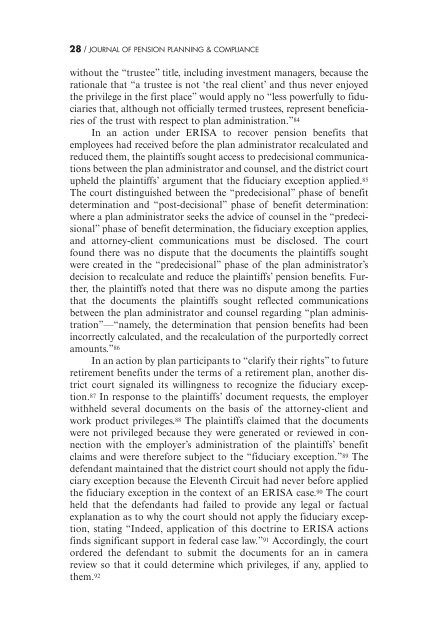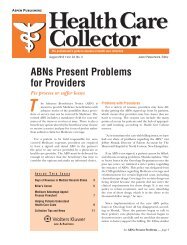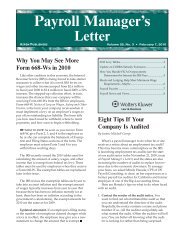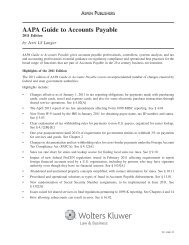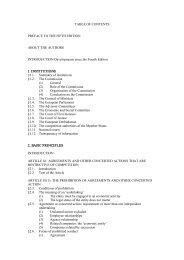journal of pension planning & compliance - Kluwer Law International
journal of pension planning & compliance - Kluwer Law International
journal of pension planning & compliance - Kluwer Law International
You also want an ePaper? Increase the reach of your titles
YUMPU automatically turns print PDFs into web optimized ePapers that Google loves.
28 / JOURNAL OF PENSION PLANNING & COMPLIANCE<br />
without the “trustee” title, including investment managers, because the<br />
rationale that “a trustee is not ‘the real client’ and thus never enjoyed<br />
the privilege in the first place” would apply no “less powerfully to fiduciaries<br />
that, although not <strong>of</strong>ficially termed trustees, represent beneficiaries<br />
<strong>of</strong> the trust with respect to plan administration.” 84<br />
In an action under ERISA to recover <strong>pension</strong> benefits that<br />
employees had received before the plan administrator recalculated and<br />
reduced them, the plaintiffs sought access to predecisional communications<br />
between the plan administrator and counsel, and the district court<br />
upheld the plaintiffs’ argument that the fiduciary exception applied. 85<br />
The court distinguished between the “predecisional” phase <strong>of</strong> benefit<br />
determination and “post-decisional” phase <strong>of</strong> benefit determination:<br />
where a plan administrator seeks the advice <strong>of</strong> counsel in the “predecisional”<br />
phase <strong>of</strong> benefit determination, the fiduciary exception applies,<br />
and attorney-client communications must be disclosed. The court<br />
found there was no dispute that the documents the plaintiffs sought<br />
were created in the “predecisional” phase <strong>of</strong> the plan administrator’s<br />
decision to recalculate and reduce the plaintiffs’ <strong>pension</strong> benefits. Further,<br />
the plaintiffs noted that there was no dispute among the parties<br />
that the documents the plaintiffs sought reflected communications<br />
between the plan administrator and counsel regarding “plan administration”—“namely,<br />
the determination that <strong>pension</strong> benefits had been<br />
incorrectly calculated, and the recalculation <strong>of</strong> the purportedly correct<br />
amounts.” 86<br />
In an action by plan participants to “clarify their rights” to future<br />
retirement benefits under the terms <strong>of</strong> a retirement plan, another district<br />
court signaled its willingness to recognize the fiduciary exception.<br />
87 In response to the plaintiffs’ document requests, the employer<br />
withheld several documents on the basis <strong>of</strong> the attorney-client and<br />
work product privileges. 88 The plaintiffs claimed that the documents<br />
were not privileged because they were generated or reviewed in connection<br />
with the employer’s administration <strong>of</strong> the plaintiffs’ benefit<br />
claims and were therefore subject to the “fiduciary exception.” 89 T h e<br />
defendant maintained that the district court should not apply the fiduciary<br />
exception because the Eleventh Circuit had never before applied<br />
the fiduciary exception in the context <strong>of</strong> an ERISA case. 90 The court<br />
held that the defendants had failed to provide any legal or factual<br />
explanation as to why the court should not apply the fiduciary exception,<br />
stating “Indeed, application <strong>of</strong> this doctrine to ERISA actions<br />
finds significant support in federal case law.” 91 Accordingly, the court<br />
ordered the defendant to submit the documents for an in camera<br />
review so that it could determine which privileges, if any, applied to<br />
them. 92


